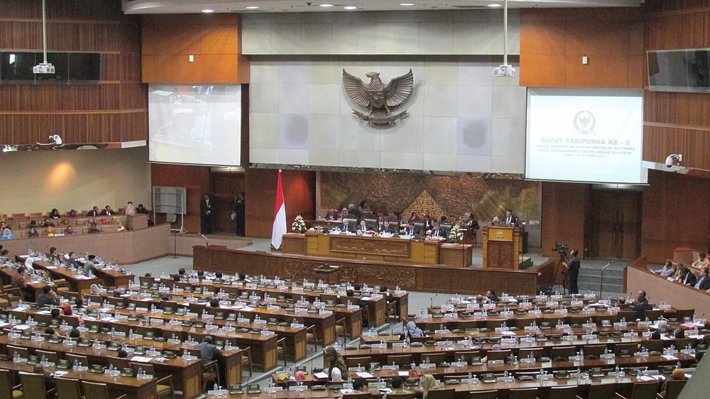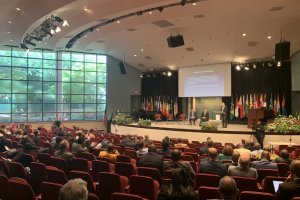An expansion of blasphemy laws in Indonesia as part of the nation’s revised criminal code has heightened concerns among Christian persecution watchdogs and human rights groups that members of minority faiths will be particularly vulnerable as targets of the amended legislation.

International Christian Concern (ICC), a nondenominational, nongovernmental Christian watchdog group headquartered in Washington, D.C., warns that the proposed revisions to Indonesia’s criminal code include provisions that would criminalize not just proselytization but also apostasy or the renunciation of religious belief.
Although parts of the revisions to the criminal code, titled “Criminal Actions Against Religious Belief and Religious Life,” are aimed at regulating interfaith engagement, the provisions potentially endanger minority groups.
“While there are components which could be taken favorably, we are more nervous for Christians and religious minorities in Indonesia who will be unfairly discriminated against with these updates,” said Timothy Carothers, ICC’s advocacy manager for Southeast Asia.
“The Indonesian government has missed the mark on an opportunity to protect individual liberties,” he said, “and has concerningly given updated tools for hardliners and activists to exploit in silencing opposing views and vulnerable people, including religious minorities, which we have continued to see across Indonesia.”
According to ICC, Indonesia is among a handful of countries vigorously expanding its blasphemy laws rather than taking a leaf from growing demands across many developing nations to stop the violation of free speech.
“In many countries, mostly Muslim-majority ones, such laws have created a magnitude of problems as they have become an effective weapon in the hands of the powerful majority to restrict minority groups from exercising their faith or to bridle freedom of expression,” stated the Union of Catholic Asian News, a Hong Kong-based independent Catholic media service, in an article last October.
Indonesia has had blasphemy laws since 1965, under which more than 100 people have been prosecuted. Offenders face a maximum of five years in prison, and several attempts to get rid of the law over the years have failed.
The proposed revisions to the law, which are expected to be passed before the 77th anniversary of Indonesian Independence on August 17, include four articles: defaming a religion; persuading anyone to be a non-believer; disturbing a religious ritual or creating noise near a house of worship; and insulting clerics who are leading a ritual.
“These four articles violate the right to freedom of religion or expression and, like the current blasphemy law, will be used to discriminate against religious minorities,” Andreas Harsono, a researcher on Indonesia at Human Rights Watch, wrote in a 2019 article.
“The new provisions are also discriminatory in that they only cover the six officially recognized religions in Indonesia: Islam, Protestantism, Catholicism, Hinduism, Buddhism, and Confucianism. Hundreds of other local religions and beliefs are excluded.”
The proposed revisions also enable law enforcement to target violations over information technology platforms, including social media.
One of the revisions, Article 304, makes it a crime for anyone to attempt to change another person’s religion or to make them irreligious by means of public incitement or threats.
“While the prevention of forced religious conversions is a rightful decision to protect vulnerable religious minorities,” wrote International Christian Concern last week, its revisions border on “the criminalization of proselytization and apostasy.”
“Blasphemy laws criminalize expression that insults or offends religious doctrines,” states the U.S. Commission on International Religious Freedom “Such laws are often used to restrict freedom of religion or belief…The enforcement of such laws—either government enforcement or mob violence—undermines human rights, including freedom of religion or belief and freedom of expression.”
In its 2022 report on the state of religious freedom around the world, the USCIRF urged the U.S. government to include Indonesia on the State Department’s “Special Watch List” for “engaging in or tolerating severe violations of religious freedom.”
It also recommended that Washington work with Jakarta to revise its criminal code legislation “to comply with international human rights standards,” including removing criminal punishment for blasphemy, repealing or amending existing blasphemy laws, and releasing all individuals detained or imprisoned on blasphemy charges.
_______________
From its beginnings, the Church of Scientology has recognized that freedom of religion is a fundamental human right. In a world where conflicts are often traceable to intolerance of others’ religious beliefs and practices, the Church has, for more than 50 years, made the preservation of religious liberty an overriding concern.
The Church publishes this blog to help create a better understanding of the freedom of religion and belief and provide news on religious freedom and issues affecting this freedom around the world.
The Founder of the Scientology religion is L. Ron Hubbard and Mr. David Miscavige is the religion’s ecclesiastical leader.
For more information visit the Scientology website or Scientology Network.


